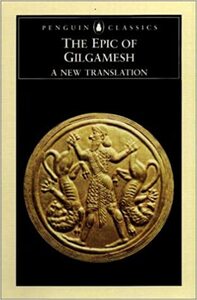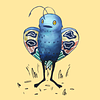Take a photo of a barcode or cover
adventurous
challenging
informative
fast-paced
Plot or Character Driven:
N/A
Strong character development:
Complicated
Loveable characters:
Complicated
Diverse cast of characters:
Complicated
Flaws of characters a main focus:
No
adventurous
fast-paced
Plot or Character Driven:
A mix
Strong character development:
Yes
Loveable characters:
Yes
Diverse cast of characters:
No
Flaws of characters a main focus:
Yes
Interesting myth that I really enjoyed. Read for school.
adventurous
inspiring
reflective
fast-paced
Plot or Character Driven:
A mix
Flaws of characters a main focus:
Yes
A fun but simple story, abundant with thoughtful moral lessons. It is one of the oldest stories in human history, so some credit has to be given for that.
I just wish I did a better job of picking my translations lol. The problem with Gilgamesh is that the existing records of the story are fragmented and there seem to be no living descendants of the Akkadian language, making translation into a continuous story an incredibly difficult task.
Andrew George’s translation is the go-to for a version that tries to stay true to the meaning and textual authenticity of the original text. That also means however that it is also rife with missing passages reflecting the text’s fragmented state, leading to a lot of chapters feeling somewhat incomplete and confusing to decipher. Merit however, has to be given to George for attempting to fill in some of the gaps with educated guesses on what the meaning could have been. He also provides summaries of each tablet so that you get the general idea of what is happening in each chapter. But, the lack of continuity between passages is hard to ignore, and so I wanted to try other versions.
Then there’s Sophus Helle’s version, which promises to be a newer translation and a more updated version that carries on from George’s original work. The only problem is that Sophus makes NO attempt to guess or fill in the incomplete passages, leading to a more egregious narration of the text that is somehow even more confusing than George’s translation. It seems that the intent behind this translation was to appeal to scholarly studies of the text rather than facilitate overall readability in the first place.
Finally, I stuck with Stephen Mitchell’s translation, which I should have done in the first place. Yes, he is criticised for taking creative liberties with some of the passages, but he is the only version I’ve read that actually presents a complete story. There are no gaps in the passages, and for first-time readers, it is an excellent way to enjoy the actual story without losing your mind over passages that seem to appear in one chapter and then disappear in the next.
If you’re reading Gilgamesh just to understand the story, do yourself a favour and just read Mitchell’s translation. The criticisms of creative liberties are of little value or importance to anyone who isn’t a scholar studying the Akkadian language.
I just wish I did a better job of picking my translations lol. The problem with Gilgamesh is that the existing records of the story are fragmented and there seem to be no living descendants of the Akkadian language, making translation into a continuous story an incredibly difficult task.
Andrew George’s translation is the go-to for a version that tries to stay true to the meaning and textual authenticity of the original text. That also means however that it is also rife with missing passages reflecting the text’s fragmented state, leading to a lot of chapters feeling somewhat incomplete and confusing to decipher. Merit however, has to be given to George for attempting to fill in some of the gaps with educated guesses on what the meaning could have been. He also provides summaries of each tablet so that you get the general idea of what is happening in each chapter. But, the lack of continuity between passages is hard to ignore, and so I wanted to try other versions.
Then there’s Sophus Helle’s version, which promises to be a newer translation and a more updated version that carries on from George’s original work. The only problem is that Sophus makes NO attempt to guess or fill in the incomplete passages, leading to a more egregious narration of the text that is somehow even more confusing than George’s translation. It seems that the intent behind this translation was to appeal to scholarly studies of the text rather than facilitate overall readability in the first place.
Finally, I stuck with Stephen Mitchell’s translation, which I should have done in the first place. Yes, he is criticised for taking creative liberties with some of the passages, but he is the only version I’ve read that actually presents a complete story. There are no gaps in the passages, and for first-time readers, it is an excellent way to enjoy the actual story without losing your mind over passages that seem to appear in one chapter and then disappear in the next.
If you’re reading Gilgamesh just to understand the story, do yourself a favour and just read Mitchell’s translation. The criticisms of creative liberties are of little value or importance to anyone who isn’t a scholar studying the Akkadian language.
adventurous
emotional
lighthearted
fast-paced
Plot or Character Driven:
Character
Strong character development:
Yes
Loveable characters:
Yes
Diverse cast of characters:
No
Flaws of characters a main focus:
No
I was absolutely enthralled by the beautiful prose of this epic. The characters deep devotion for each other throughout the trials of life was frankly, quite queer. It was everything one could want. Prophecies, trantruming and petty gods, epic adventures, deep brotherly (or gay, up to the reader perhaps) affection and devotion, and of course- tragedy. Absolute 5 cuneiform stars.
I was not really entertained by this book :(
Of course when it was composed, it was one of the first examples of written literature EVER created, so I probably would have been entertained by it back then. I mean, props to the writer who, with basically no blueprint or any other writers to get inspiration from, composed this work. That’s no mean feat.
Still 1 star tho ;)
Of course when it was composed, it was one of the first examples of written literature EVER created, so I probably would have been entertained by it back then. I mean, props to the writer who, with basically no blueprint or any other writers to get inspiration from, composed this work. That’s no mean feat.
Still 1 star tho ;)
emotional
reflective
medium-paced
Plot or Character Driven:
Character
Strong character development:
Yes
Loveable characters:
No
Diverse cast of characters:
Yes
Flaws of characters a main focus:
Yes
adventurous
fast-paced
Plot or Character Driven:
A mix
Strong character development:
Complicated
adventurous
medium-paced
Plot or Character Driven:
Character
Strong character development:
No
Loveable characters:
Yes
Diverse cast of characters:
No
Flaws of characters a main focus:
No




